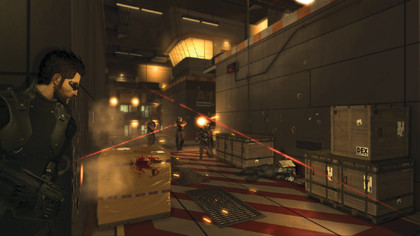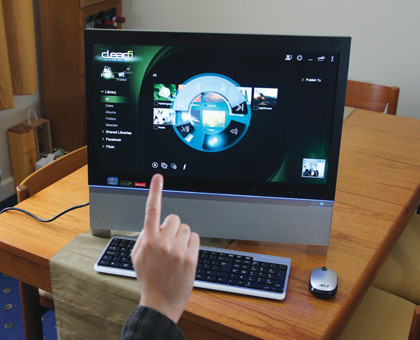
Fortunately, touch is coming to mainstream gaming too. Well, it's actually already here but it's either surreptitious or else it's accidental, but we're still claiming it's real.
The formats that are going to gain the most outside of the casual arena are adventures and strategy games. You may have spotted that both of these have the advantage that they're not necessarily the fastest paced of games.
The big issue, particularly for RTS games but can even affect adventures too, is that a quick-tap is equivalent to a left-click and a long-tap performs a right-click. This effectively eliminates the ability to do quick right-click actions.
Most dedicated touch devices have developed alternatives, such as the two-finger tap or hold one finger down and tap second. Unless a game is developed with touch in mind, you're stuck with what Windows 7 has to offer, and that's limited.
Even with these limitations many adventure games and less hectic strategy games play wonderfully on a touchscreen. If anything we love the switch you can make between active moments using the mouse and more contemplative sections using the touchscreen interface.
The same type of system goes for some RPGs as well, though many tend to lean heavily on mouse and keyboard. Non-combat areas such as inventory management, spell casting or crafting can all take advantage of touchscreen input.
One genre of gaming that we're not expecting touch to have an impact on is first person shooters. This a PC genre that is very much going to stay a realm of the mouse and keyboard. That's not to say touch systems aren't able to run them, and in a similar way to RPGs we can see room within FPS titles to add extra interactivity into the game world by using touch within environment.
Sign up for breaking news, reviews, opinion, top tech deals, and more.
Take Deus Ex: Human Revolution, which has a world littered with supposedly interactive elements from touch newspapers to hackable door locks. To make these mouse accessible the game almost has to cut away from the world so you can click on the right parts with the mouse, with a touchscreen they'd be no need and you could directly interact with the game world.
The same goes for any games with in-world elements, while touch could be used for physical game-world interaction. So picking up and manipulating items via touch to complete physics puzzles or just completing a weapon loadout.
None of this in itself is going to change the world, but it's certainly going to change how you play in your gaming worlds.
Touchy me, touchy you

Like us, many of you will be thinking 'I'm never going to lean forward and touch my screen'. You're probably right, it's a lot of effort and not entirely natural thing to do, especially when sitting down.
We're sure touchscreens will appear but direct touch could well be limited to tablets and all-in-one systems. However, Kinect and the Acer Aspire Z5xxx range, with their front-facing cameras, show a way of interacting that cuts out that bacteria filled touching business with seemingly reasonable precision.
We used the Windows 8 Developer Preview and those two up-to-date all-in-one touch panel PCs mentioned previously: the MSI Wind Top AE2210 is a lovely Intel Core i3 2100 Sandy Bridge graphics, 20-inch unit, which sells for a little over £650.
The Dell Inspiron 2310 is more up-market with an improved Intel Core i5 and Nvidia GT 525M graphics chipset. This has a little more muscle but is also a little more pricey, selling at around £799.
Interestingly both use what we suspect is the same two-point touch sensor. We suspect this is an IR-based system as they both detect finger movement before contact is made and there was vague issues with accuracy at the extreme edges of the screen.
That aside both worked flawlessly with the Windows 8 Developer Preview OS indeed they were both as fast as when used under Windows 7. Tablets and phones are going to continue to be the main focus for touch, but we're waiting to see what trickles down to the PC.
--------------------------------------------------------------------------------------------------
First published in PC Format Issue 261